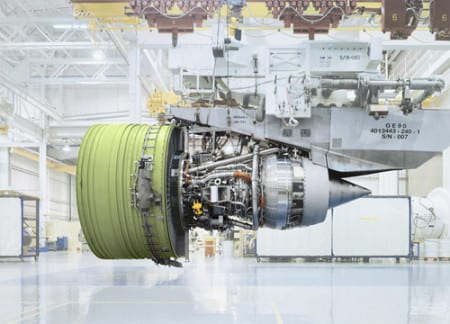Imagine an airplane that, instead of needing routine maintenance on its engines every time it flies, is smart enough to speak up when it needs preventative upkeep. That’s one potential application of GE’s Predix cloud computing platform, a sort of social network for the industrial equipment that’s coming online. The company is betting that Predix, part of its newly formed GE Digital unit, will be the missing link between heavy-duty machinery and the ongoing service those machines require.

If they’re successful, it could completely change the way field service teams are managed and deployed. “Field service engineers are going to evolve and become more preventative solutions providers than the wrench-turning person,” says Bobby George, CIO of field services for GE. “And they are going to become more value added in their advice [to customers] on the use and operation of equipment.”
Take the aircraft example. A single jet engine could create mountains of digital intel. Multiply that by the more than 100,000 flights that take off every day globally, and you’ve got a big data source that could be used to predict any number of circumstances. Planes flying in the Middle East, for example, often encounter higher temperatures and dust levels than planes on other flight paths, says George, which means different repair requirements. “Why should we determine the frequency of our maintenance programs by hours of flight rather than conditions?” he asks.
New Services, New Roles
Traditionally, GE’s service agreements have fallen within two tiers, says George: comprehensive full-service contracts to prevent downtime and minimize customers’ risk, and incremental service, in which GE supplies service and part replacements when a product fails.
With Predix, the company is hoping to open up new opportunities between the two tiers, providing not just service, but also insight into equipment use and performance.
“Field service engineers are going to evolve and become more preventative solutions providers than the wrench-turning person.” — Bobby George, GE
In the short term, the roughly 35,000 field service technicians at GE will use Predix data to perform their current jobs more efficiently. Longer term, those technicians armed with critical data at their fingertips, could offer customers valuable advice on how to improve efficiency and productivity.
“I’d categorize it as real-time operative intelligence,” says George. “They’ll be able to make the appropriate diagnosis and narrow down solution techniques, which will minimize the time and effort required to fix an issue.”

Initially, Predix was built to service GE’s largest equipment, including airplane engines, gas and wind turbines, locomotive engines and medical equipment. As the system has grown, though, GE has started white labeling the service for other companies. Pitney Bowes recently signed on to use Predix to track customers’ printing and mailing equipment performance. Eventually, the company says it will package and sell that intel to customers, opening up new revenue streams through service.
The Age of the Specialized Tech
While the predictive qualities of Predix will certainly lessen the need for repair technicians, George says he doesn’t foresee a dramatic reduction looming. Instead, he says, field techs’ responsibilities will likely include a more advisory role. And as GE partners with other companies, there may be even more jobs on the horizon.
“There are going to be applications that either the customers are going to build or OEMs like us are going to provide that will require user training and implementation at customer sites that will be secondary value streams,” he says. “The next 1.5 years is going to be all about connection — getting machines connected.”
And after the data is flowing? “The next phase is to optimize the service options for each customer,” he says. “Who better than the field service engineer, who understands the equipment and the customers, to become that trusted adviser?”


Share this: